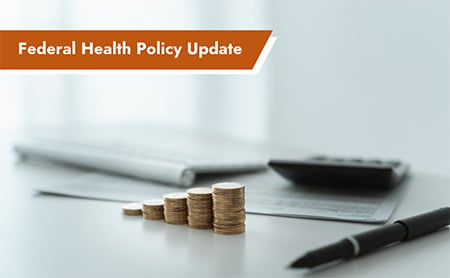An Ounce of Prevention (and Public Health Fund) Is Worth a Pound of Cure
May 19, 2025 | Catherine Murphy
 Among federal funding for public health programs, one line is particularly unique. The Prevention and Public Health Fund (PPHF) is the nation’s first mandatory fund for prevention and public health programs. Before enacting PPHF, there was no fund that guaranteed investment in prevention programs that was not contingent on the annual appropriations process. PPHF was part of the 2010 Patient Protection and Affordable Care Act and it helps provide funding for crucial programs. During the past 15 years, PPHF has been utilized across agencies including CDC, CMS, HRSA, and SAMHSA. In fact, about 95% of PPHF funding goes to CDC. In FY24, the fund contributed 13% of CDC’s overall budget. From FY25 through FY30, PPHF is projected to provide $9.8 billion in funding to achieve these goals.
Among federal funding for public health programs, one line is particularly unique. The Prevention and Public Health Fund (PPHF) is the nation’s first mandatory fund for prevention and public health programs. Before enacting PPHF, there was no fund that guaranteed investment in prevention programs that was not contingent on the annual appropriations process. PPHF was part of the 2010 Patient Protection and Affordable Care Act and it helps provide funding for crucial programs. During the past 15 years, PPHF has been utilized across agencies including CDC, CMS, HRSA, and SAMHSA. In fact, about 95% of PPHF funding goes to CDC. In FY24, the fund contributed 13% of CDC’s overall budget. From FY25 through FY30, PPHF is projected to provide $9.8 billion in funding to achieve these goals.
Where the Money Goes
As the adage goes, “an ounce of prevention is worth a pound of cure.” Through dollars distributed by CDC — more than 70% of CDC’s budget supports the work of state and local health organizations — PPHF funds numerous critical nationwide efforts including immunization, epidemiology and laboratory capacity, tobacco use, heart attack and stroke, childhood lead poisoning, and the Preventive Health and Health Services Block Grant. Many of these programs receive a majority, if not all, of their funding from PPHF, and the demonstrated return-on-investment is significant. For example, California’s tobacco control program saved $155 in health care cost savings for every $1 invested. CDC has found that removing lead hazards from children's environment can, “generate approximately $84 billion in long-term benefits per birth cohort.
Sustained Commitment for the Decade Ahead
Unfortunately, PPHF has historically been subject to cuts via budget agreements, including the Bipartisan Budget Act (2018), and to calls to repeal and replace the Affordable Care Act. Since its enactment, PPHF has been amended five times, ultimately resulting in a reduction in appropriations for the fund. Recently, President Trump’s “Skinny” Budget Proposal outlined cuts to a number of PPHF-funded programs, indicating that the overall funding could be at risk.
Eliminating PPHF would open a significant funding gap for preventive health programs across the nation. These programs have proven records of promoting health and preventing infectious and chronic disease. Loss of funding would likely result in greater disease burden and health care costs. Investing in prevention isn’t just smart policy, it’s smart economics. The PPHF is designed to build a strong public health foundation, brick by brick, community by community.
Over the years, ASTHO has worked in coalition with public health organizations to share the importance of PPHF and to advocate for sustained investment to the fund. ASTHO will continue to monitor discourse and share the importance of this funding in interactions with lawmakers.
Table 1. PPHF Funded Programs at CDC (in thousands), FY24
| Program | Budget Authority | PPHF | Total Funding | % PPHF |
|---|---|---|---|---|
| Immunization and Respiratory Diseases | 237,358 | 681,933 | 919,291 | 74.18 |
| Immunization Program | 0 | 681,933 | 681,933 | 100 |
| Emerging and Zoonotic Infectious Diseases | 708,272 | 52,000 | 760,272 | 6.84 |
| Epidemiology and Laboratory Capacity | 0 | 40,000 | 40,000 | 100 |
| Healthcare-Associated Infections | 0 | 12,000 | 12,000 | 100 |
| Chronic Disease Prevention and Health Promotion | 1,192,647 | 241,267 | 1,433,914 | 16.83 |
| Tobacco | 120,650 | 125,850 | 246,500 | 51.05 |
| Heart Disease and Stroke | 125,850 | 29,255 | 155,105 | 18.86 |
| Diabetes | 89,717 | 66,412 | 156,129 | 42.54 |
| Million Hearts | 0 | 5,000 | 5,000 | 100 |
| National Early Child Care Collaboratives | 0 | 5,000 | 5,000 | 100 |
| Hospitals Promoting Breastfeeding | 0 | 9,750 | 9,750 | 100 |
| Environmental Health | 191,850 | 51,000 | 242,850 | 21.00 |
| Childhood Lead Poisoning Prevention | 0 | 51,000 | 51,000 | 100 |
| Cross-Cutting Activities and Program Support | 503,570 | 160,000 | 663,570 | 24.11 |
| Preventive Health and Health Services Block Grant | 0 | 160,000 | 160,000 | 100 |
| CDC, Total | 7,937,588 | 1,186,200 | 9,123,788 | 13 |
Source: CDC Budget Operating Plans